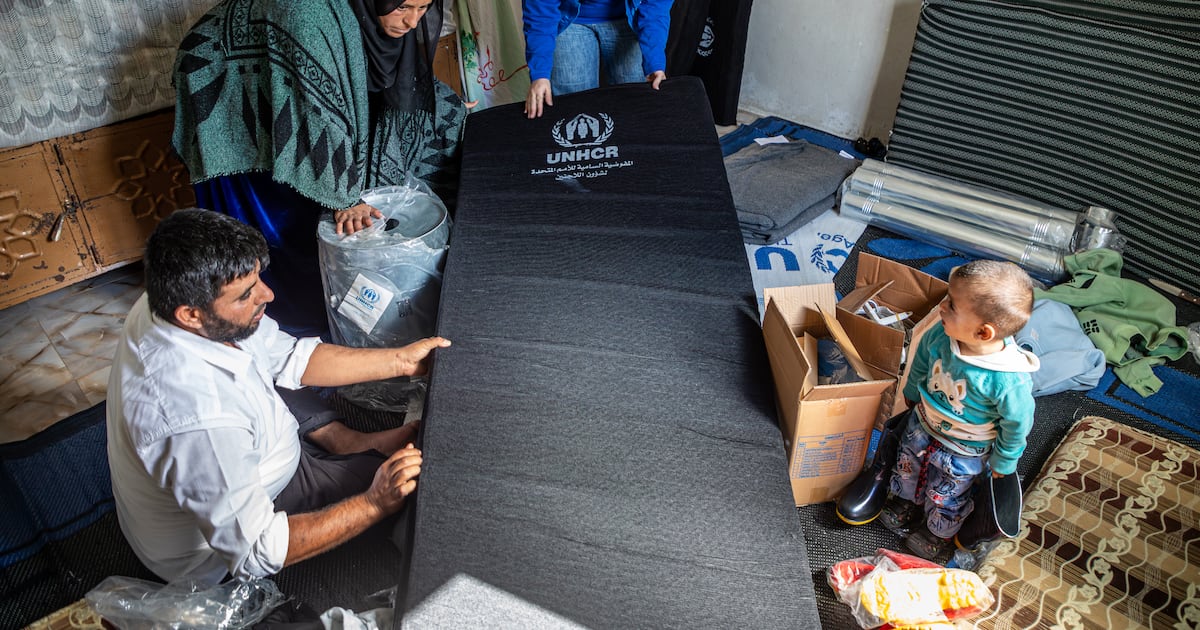Humanitarian aid budgets have been “stretched to breaking point” as winter approaches due to funding cuts, the UN’s agency for refugees (UNHCR) has said.
UNHCR is expecting to end the year with $3.9bn in funding – the same amount in 2015, when there was half the number of displaced people, a spokesperson for the agency told The National.
It is also a “significant reduction” from last year’s budget, which reached $5bn.
The refugee agency needs to raise $35 million to help repair and insulate homes destroyed by conflicts in Syria, Ukraine and Afghanistan, provide blankets to children and the elderly, and money to buy medicines and hot food.
With targets falling short after governments, including the US and UK, slashed their overseas aid budgets, the agency is turning to individual philanthropists and the private sector for donations.
The need is particularly acute in the Middle East, where over one million Syrians who returned after the fall of the Assad regime in December 2024 live in homes devastated by the conflict. About 750,000 people are estimated to be living without enough support – blankets, mattresses, solar lamps or winter clothing – to keep warm.
“Humanitarian budgets are stretched to breaking point and the winter support that we offer will be much less this year,” said Dominique Hyde, UNHCR’s director of external relations, who just returned from Syria and Jordan.
“Families will have to endure freezing temperatures without things many of us take for granted: a proper roof, insulation, heating, blankets, warm clothes or medicine.”
“Families I met in Jordan hold on to the hope of returning but are daunted by the immense challenge of rebuilding. With a bitter winter approaching, most are struggling to overcome the hurdles with almost nothing.”
Cuts to overseas aid, a continuing trend since the pandemic, are expected to worsen.
US cuts to overseas aid could reach $5bn after pay outs were paused in January. The UK announced earlier this year that it would also reduce aid, from 0.5 per cent of GDP to 0.3 per cent from 2027, to prioritise defence spending.
Families in Afghanistan are already exposed to freezing temperatures. Around 2.2 million are Afghan refugees returned under pressure from Pakistan and Iran this year alone, with so little to go back to they are in need of assistance. Two devastating earthquakes, including one of 6.3 magnitudes last week, have further destroyed people’s homes, including those of returnees.
The agency hopes to reach 90,000 families before the end of the year.
Temperatures could reach – 20 degrees in Ukraine, where UNHCR will give aid to 390,000 people. Russian attacks on energy infrastructure has left people across regions in Ukraine without electricity, gas and water for several days.
“This leaves people in front-line areas at particularly heightened risk, but it is affecting people across the country,” said Elisabeth Arnsdorf Haslund, the agency’s spokesperson for Ukraine.
“Many people still remain without heating, even as temperatures drop, and winter is truly setting in,” she said.
“Displaced families should not have to face winter alone. Our teams are on the ground, determined to protect refugees from the cold, but we are running out of time and resources,” Ms Hyde added.
Mohammed bin Zayed Majlis
WRESTLING HIGHLIGHTS
